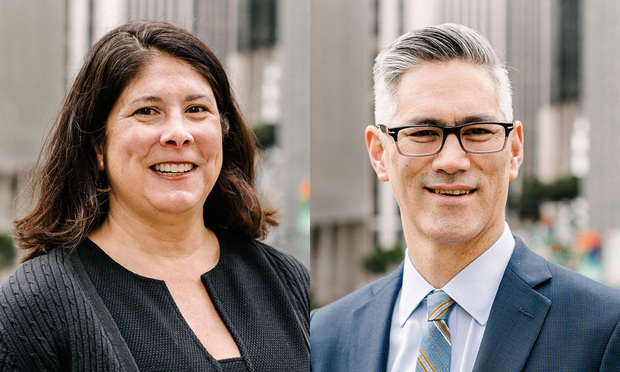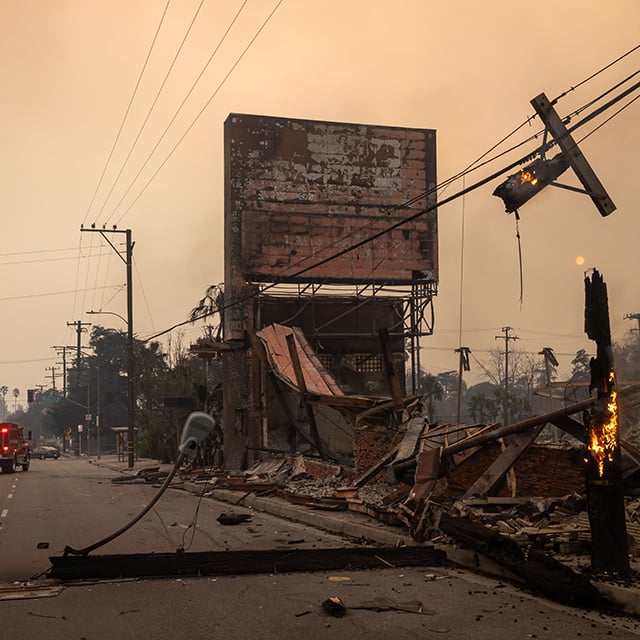Evolving Whistleblower Immunity Under the Defend Trade Secrets Act of 2016
This May marked the three-year anniversary of the Defend Trade Secrets Act. While the prohibitions against trade secret misappropriation created by the DTSA have been well vetted since the Act's inception, less frequently discussed is the immunity granted under the Act to certain individuals who might expose trade secrets: whistleblowers.
July 18, 2019 at 06:51 PM
8 minute read
 (Left to right) Monica Mucchetti Eno and Daniel Sakaguchi, from Alto Litigation (Photo: Courtesy Photo)
(Left to right) Monica Mucchetti Eno and Daniel Sakaguchi, from Alto Litigation (Photo: Courtesy Photo)
This May marked the three-year anniversary of the Defend Trade Secrets Act (DTSA). While the prohibitions against trade secret misappropriation created by the DTSA have been well vetted since the Act's inception, less frequently discussed is the immunity granted under the Act to certain individuals who might expose trade secrets: whistleblowers.
Often, whistleblowers are stymied in their ability to fully and accurately inform government officials about a company's wrongdoing because of fear of retaliation. Where potential fraudulent or criminal activities can only be established through documents or information that is proprietary to the company, the challenges of whistleblowing are even greater.
With these impediments in mind, Congress included a whistleblowing provision in the DTSA. Press Release, Office of Senator Chuck Grassley, Leahy-Grassley Amendment Protecting Whistleblowers Earns Unanimous Support in Judiciary Committee (Jan. 28, 2016) (explaining purpose of provision to “prevent retaliation and even encourage people to speak out when they witness violations of the law”); see also Federal Committee Report, 2015 FD S.B. 1890 (NS) at 14 (March 7, 2016) (“The bill would strengthen existing whistleblower protections to protect individuals from potential trade secret claims.”). In discussing the amendment to the DTSA, which created the protection under 18 U.S.C. §1833(b), then Senate Judiciary Chairman Chuck Grassley who co-authored the amendment stated “[t]he amendment I championed with Senator Leahy ensures that these whistleblowers won't be slapped with allegations of trade secret theft when responsibly exposing misconduct.” Id. That, however, has not been the universal result. Increasingly, courts are reading §1833(b) not as an outright bar to litigation that may be raised at the pleading stage, but rather an affirmative defense that would still require the defendant to litigate.
DTSA §1833(b) provides, in pertinent part:
(b) Immunity From Liability for Confidential Disclosure of a Trade Secret to the Government or in a Court Filing.—
(1) Immunity. An individual shall not be held criminally or civilly liable under any Federal or State trade secret law for the disclosure of a trade secret that
(A) is made
(i) in confidence to a Federal, State, or local government official, either directly or indirectly, or to an attorney; and
(ii) solely for the purpose of reporting or investigating a suspected violation of law; or
(B) is made in a complaint or other document filed in a lawsuit or other proceeding, if such filing is made under seal.
(2) Use of trade secret information in anti-retaliation lawsuit.—An individual who files a lawsuit for retaliation by an employer for reporting a suspected violation of law may disclose the trade secret to the attorney of the individual and use the trade secret information in the court proceeding, if the individual—
(A) files any document containing the trade secret under seal; and
(B) does not disclose the trade secret, except pursuant to court order.
18 U.S.C. §1833(b) (2012).
The statute's mandatory language—“shall not be held … civilly liable”—appeared to be a straightforward bar to liability, causing some early observers to believe that the provision might serve as an ex ante litigation bar, without placing the burden on a trade secret defendant to show that a safe harbor should exist. See, e.g., Peter S. Menell, Misconstruing Whistleblower Immunity Under the Defend Trade Secrets Act, 1 Nev. L.J. Forum 92 (2017). However, in the few reported cases that have addressed §1833(b) since its enactment, courts have held that the provision must be raised as an affirmative defense.
In Unum Group v. Loftus, 220 F. Supp. 3d 143 (D. Mass. 2016), Loftus, a veteran director of disability benefits at Unum removed several boxes of information from his employer's offices after being interviewed as part of an internal investigation. Loftus provided the information to his counsel, who informed Unum that Loftus had secured the documents to prevent their destruction. Unum then sued Loftus for trade secret misappropriation under federal and state law and conversion.
Loftus moved to dismiss the trade secret claims under §1833(b). The Massachusetts district court, however, denied the motion and held that the DTSA's whistleblower immunity provision was an affirmative defense that could only be adjudicated at the pleading stage based on the allegations in the complaint. Among other things, the court did not consider the significance of the documents Loftus had taken, and stated only that “Loftus [had] not filed any potential lawsuit that could be supported by information in those documents.” Moreover, the court granted a preliminary injunction and ordered Loftus to turn over or destroy all copies of the Unum documents he had taken.
Similarly, in 1-800 Remodel v. Bodor, No. CV 18-472-DMG (EX), 2018 WL 6340759 (C.D. Cal. Oct. 17, 2018), the court considered whether plaintiff's DTSA and CUTSA claims should be dismissed where defendant alleged she had taken plaintiff's trade secrets for purposes of filing numerous complaints with the Consumer Affairs Contractor State License Board (CSLB). The Complaint did not reveal the nature of the defendant's CSLB complaints (which would have been necessary to ascertain whether they were made for the “purpose of reporting or investigating a suspected violation of law” as §1833(b) requires) or indicate whether the disclosures to the DTSA had been made “in confidence”. As such, the Court concluded that at the pleading stage, it could not “assume that th[e] [§1833(b)] immunity provision bars Plaintiff's DTSA and CUTSA claims arising out of Defendant's anticipated and actual disclosure of confidential and proprietary information to the CSLB.” Id. at *6.
In the only other case to consider §1833(b) to date, Christian v. Lannet Co., No. 16-CV-963, 2018 WL 1532849 (E.D. Pa. March 29, 2018), the court did rely on it to dismiss a trade secret claim, but the case does not provide assurance of ex ante immunity. In that case, Christian had already brought a lawsuit against his former employer, Lannet Co., based on claims that it had retaliated against him—and the trade secret claims were among Lannet's counterclaims. Further, ample discovery had already occurred without any effort on the company's part to claw back the documents on which Christian's claims were based. In other words, the record made clear that the documents had been used to investigate and prepare claims, so it was not a stretch for the court to apply the immunity provisions on this developed record.
But the mere fact that §1833(b) appears to be an affirmative defense does not mean that it lacks utility. Arguably, the defendants' attempts to assert 1833(b) as a shield in Unum and 1-800 Remodel were rejected because the record did not offer the proof required by §1833(b), namely that the company's trade secrets had been disclosed only (1) to a Federal, State or local official or attorney, (2) to report or have investigated a suspected violation of law, and (3) in confidence.[1] A whistleblower employee wishing to establish immunity under §1833(b) should not merely hold on to trade secret evidence of wrongdoing; they should act on it quickly by retaining qualified counsel who can file a complaint with the relevant governmental authorities. Then, if the whistleblower is terminated and/or sued for their wrongdoing, they can ask the court to take judicial notice of the filed complaint(s) to support their claims of immunity.
Endnote:
[1] For reasons that are not explained in the holding, in moving to dismiss, the defendant in 1-800 Remodel does not appear to have submitted copies of the complaints she allegedly filed with the CSLB or offer evidence that trade secret information provided to the CSLB was provided in confidence. 1-800 Remodel, 2018 WL 6340759 at *6.
Daniel Sakaguchi is a partner at Alto Litigation. Daniel advises technology companies in Silicon Valley and beyond in a range of intellectual property and commercial disputes, including trade secret, trademark and copyright disputes.
Monica Mucchetti Eno is of counsel at Alto Litigation. She represents clients in intellectual property and commercial litigation matters in federal and state court.
This content has been archived. It is available through our partners, LexisNexis® and Bloomberg Law.
To view this content, please continue to their sites.
Not a Lexis Subscriber?
Subscribe Now
Not a Bloomberg Law Subscriber?
Subscribe Now
NOT FOR REPRINT
© 2025 ALM Global, LLC, All Rights Reserved. Request academic re-use from www.copyright.com. All other uses, submit a request to [email protected]. For more information visit Asset & Logo Licensing.
You Might Like
View All
Many LA County Law Firms Remain Open, Mobilize to Support Affected Employees Amid Historic Firestorm

Legal Tech's Predictions for Artificial Intelligence in 2025

New Year, New Am Law 100: Challenges Await These Newly Merged Law Firms
7 minute readTrending Stories
- 1Meta Pulls Plug on DEI Programs
- 2On the Move and After Hours: Meyner and Landis; Cooper Levenson; Ogletree Deakins; Saiber
- 3State Budget Proposal Includes More Money for Courts—for Now
- 4$5 Million Settlement Reached With Stone Academy
- 5$15K Family Vacation Turned 'Colossal Nightmare': Lawsuit Filed Against Vail Ski Resorts
Who Got The Work
Michael G. Bongiorno, Andrew Scott Dulberg and Elizabeth E. Driscoll from Wilmer Cutler Pickering Hale and Dorr have stepped in to represent Symbotic Inc., an A.I.-enabled technology platform that focuses on increasing supply chain efficiency, and other defendants in a pending shareholder derivative lawsuit. The case, filed Oct. 2 in Massachusetts District Court by the Brown Law Firm on behalf of Stephen Austen, accuses certain officers and directors of misleading investors in regard to Symbotic's potential for margin growth by failing to disclose that the company was not equipped to timely deploy its systems or manage expenses through project delays. The case, assigned to U.S. District Judge Nathaniel M. Gorton, is 1:24-cv-12522, Austen v. Cohen et al.
Who Got The Work
Edmund Polubinski and Marie Killmond of Davis Polk & Wardwell have entered appearances for data platform software development company MongoDB and other defendants in a pending shareholder derivative lawsuit. The action, filed Oct. 7 in New York Southern District Court by the Brown Law Firm, accuses the company's directors and/or officers of falsely expressing confidence in the company’s restructuring of its sales incentive plan and downplaying the severity of decreases in its upfront commitments. The case is 1:24-cv-07594, Roy v. Ittycheria et al.
Who Got The Work
Amy O. Bruchs and Kurt F. Ellison of Michael Best & Friedrich have entered appearances for Epic Systems Corp. in a pending employment discrimination lawsuit. The suit was filed Sept. 7 in Wisconsin Western District Court by Levine Eisberner LLC and Siri & Glimstad on behalf of a project manager who claims that he was wrongfully terminated after applying for a religious exemption to the defendant's COVID-19 vaccine mandate. The case, assigned to U.S. Magistrate Judge Anita Marie Boor, is 3:24-cv-00630, Secker, Nathan v. Epic Systems Corporation.
Who Got The Work
David X. Sullivan, Thomas J. Finn and Gregory A. Hall from McCarter & English have entered appearances for Sunrun Installation Services in a pending civil rights lawsuit. The complaint was filed Sept. 4 in Connecticut District Court by attorney Robert M. Berke on behalf of former employee George Edward Steins, who was arrested and charged with employing an unregistered home improvement salesperson. The complaint alleges that had Sunrun informed the Connecticut Department of Consumer Protection that the plaintiff's employment had ended in 2017 and that he no longer held Sunrun's home improvement contractor license, he would not have been hit with charges, which were dismissed in May 2024. The case, assigned to U.S. District Judge Jeffrey A. Meyer, is 3:24-cv-01423, Steins v. Sunrun, Inc. et al.
Who Got The Work
Greenberg Traurig shareholder Joshua L. Raskin has entered an appearance for boohoo.com UK Ltd. in a pending patent infringement lawsuit. The suit, filed Sept. 3 in Texas Eastern District Court by Rozier Hardt McDonough on behalf of Alto Dynamics, asserts five patents related to an online shopping platform. The case, assigned to U.S. District Judge Rodney Gilstrap, is 2:24-cv-00719, Alto Dynamics, LLC v. boohoo.com UK Limited.
Featured Firms
Law Offices of Gary Martin Hays & Associates, P.C.
(470) 294-1674
Law Offices of Mark E. Salomone
(857) 444-6468
Smith & Hassler
(713) 739-1250






